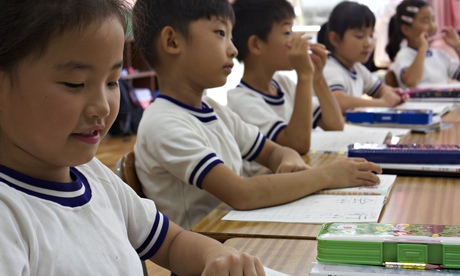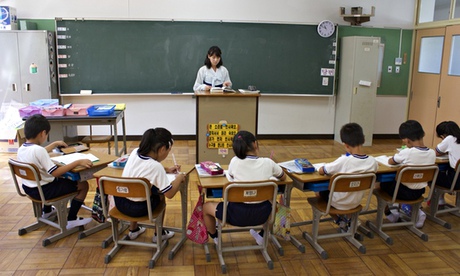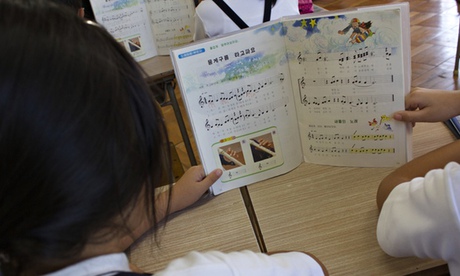ピョンヤンとの高まる緊張により苦境に立つ朝鮮学校 (英国ガーディアン記事)

千葉朝鮮初中級学校の生徒
With gentle encouragement, a group of primary school pupils fill the classroom with the cheerful tones of a children's folk song. Along the corridor, their peers make brush strokes in the air as they learn their first Japanese characters.
優しく教師に導かれ初級部の生徒達が教室を元気のよい歌声でうめつくす。廊下には彼らが初めて学んだ漢字の習字作品が並んでいる。
Dressed in white T-shirts, blue shorts and plimsolls, the pupils at this school in Chiba, on the edge of Tokyo's vast commuter belt, look like any others in Japan.
白いTシャツ、ブルーの短パンに上履き姿、東京郊外の千葉にあるこの学校の生徒達は日本のどこにでもいる子供達と全く同じだ。ただし校内で聞こえる言葉は日本語ではなく朝鮮語であり、壁に掲示されているお知らせは全てハングルで書かれている。
The language of instruction, however, is Korean, not Japanese. The notices on the wall are written in Hangul. And as the children listen to their teachers, their attention may be drawn to paintings showing a kind-looking man and his wife, surrounded by smiling children. The man is a young Kim Jong-il, the former leader of North Korea.
学校での言葉は、日本語でなく、朝鮮語だ。壁に貼ったポスターはハングルで書かれている。子供たちが先生に耳を傾けるように、彼らの注意は笑顔の子供たちに囲まれた優しく見える人とその妻が描かれた絵画に向かった。男は若い頃の金正日、北朝鮮の元指導者である。
By the time they are young adults, these children will be proficient in the language of Kim's country, versed in its music and dance and convinced – in defiance of historical consensus – that the 1950-53 war that divided the Korean peninsula into North and South Korea was started by US-led imperialists.
彼らが大人になる頃までに子どもたちは、朝鮮の音楽とダンスに精通し、キムの国の言語に堪能になる。歴史の学説を無視し、北と南に朝鮮半島を分けた1950年から1953年までの朝鮮戦争は、米国主導の帝国主義によって開始されたとされる。
Just two days into the autumn term, historical debate is furthest from the thoughts of teachers at Chiba Korean primary and junior high school, one of dozens of schools that educate the youngest among the 600,000 residents of Japan with ties to the Korean peninsula.
わずか2日間の秋学期に、歴史的な議論は千葉韓国プライマリと中学校、朝鮮半島にタイで日本60万住民の最年少の教育を学校の数十の一つの教師の思いから最も遠い。
Tensions between North Korea and Japan are threatening the survival of this and dozens of other Korean schools. Pyongyang's nuclear programme elicited a strong international response in the form of UN sanctions. But it is the regime's abduction of Japanese nationals during the cold war that resonates most in Japan, where the clamour for information about the missing has reached its peak.
北朝鮮と日本の間の緊張はこれの生存と他の朝鮮学校の数十を脅かしている。北朝鮮の核計画は、国連制裁の形で強力な国際的な応答を誘発した。しかし、それは行方不明の詳細については、叫びがピークに達している日本で最も共鳴し、冷戦中に日本国民の政権の拉致である。

平壌の政策に精通した市民を育成するのでなく、朝鮮文化への愛情を育てることに教師たちはより関心を持っていると校長は話す。
After rare high-level talks in Beijing, North Korean investigators are poised to release new information about the fate of the abductees, in return for Japan relaxing bilateral sanctions. The deal raises the prospect of a rare detente between the two countries, but for the Chiba school's headmaster, Kim Yu-sop, any warming of relations will come too late.
北京でのハイレベル協議後、北朝鮮捜査当局は日本独自の制裁の緩和と引き換えに、拉致被害者の新しい情報を公表する準備を始めた。この取り決めは両国間において希少な緊張緩和の可能性を生み出している。しかし千葉朝鮮学校のキム・ユソプ校長にとって関係改善の好ましい知らせはあまりにも遅いものだ。
"Schools like this are being punished because of anger over nuclear weapons and the abductions," he told the Guardian. "We're being discriminated against in a way that's unforgivable. Korean schools have been effectively excluded from Japan's education system for political reasons.
『私たちの学校は核問題と拉致事件の怒りのあおりを受け続けている』彼は本誌にそう話す。『私たちは許しがたい差別を受け続けている。政治的な理由により朝鮮学校は日本の教育制度からも事実上除外されている。』
"When we opened this school almost 70 years ago, life was tough, but we managed to pay our way and compile our own textbooks," Kim said. "In those days we were not seen by the rest of Japanese society as some sort of cult, as we are today. People were willing to help."
『70年前この学校を建てた時、私たちの生活はとても苦しかった。しかしなんとか道を切り開き,自分達の教科書も編纂し今日までやってきた。』彼は続けた。
『その頃は今みたいにカルト集団のようには見られてはいなかった。多くの日本の人々は私たちを進んで助けてくれた。』
That goodwill has all but evaporated. Over the past four years, prefectural and city governments have withheld subsidies from Korean schools, set up by the hundreds of thousands of men and women forcibly brought to Japan as labourers before and during the second word war.
その善意はしかしほとんどなくなってしまった。過去4年間都道府県、また多くの市は朝鮮学校への補助を保留している − 戦前・戦中に労働力として強制的に日本へ連れてこられた数十万の朝鮮人が建てた学校だというのに。
The majority of Japan's ethnic Korean community trace their roots back to what is now South Korea and, in most cases, send their children to Japanese schools. But the estimated 150,000 who remain loyal to the North regard schools like this as the only way to preserve their cultural and national heritage, amid an increasingly hostile atmosphere in their ancestors' adopted home.
在日朝鮮人社会の大多数は、現在の韓国をルーツとして、その多くは日本の学校に子供を送っている。しかし、彼らの先祖の故郷でますます敵対的な雰囲気の中で、彼らの文化と国家遺産を守るための唯一の方法として、このような北朝鮮に関して学校に忠実なままであると推定15万。
The Chiba school teaches 86 pupils between the ages of five and 12. In happier days, 20% of its budget came in the form of local subsidies, with the remainder donated by Chongryon – an association of Korean residents sympathetic to North Korea and the North's de facto embassy in Japan. The school even received modest funding from the regime in Pyongyang, but the supply ran dry with the advent of UN sanctions. The curriculum mixes the Japanese state syllabus with classes in history, language and geography devised by Chongryon, although pupils here won't begin tuition in the ideology of North Korea's founder, Kim Il-sung, until they attend senior high school.
千葉朝鮮学校は86名の生徒を教え、その予算の20%が地方補助金と日本での事実上の大使館である朝鮮総連から寄贈され。平壌の政権からささやかな資金提供を受けてきたが、国連制裁により供給は止まった。高校前までは北朝鮮創設者のイデオロギー授業を開始しない。カリキュラムは、歴史、言語、朝鮮総連が考案した地理学のクラスで日本の国家シラバスを混合している。
Chongryon's insistence on operating a separate education system has long been a source of tension with Japanese conservatives. Why, they ask, should a group that blatantly proclaims its loyalty to an unfriendly regime be treated in the same way as Japanese schools?
総聯がこだわる彼ら独自の教育システムを運営する事は日本の保守勢力との緊張の原因でもあった。何故?彼らは問う、非友好的な政権に忠誠をはっきりと宣言しているグループを日本の学校と同等に扱う必要があるのかと。

学校のカリキュラムは、総連下部組織によって考案された歴史、言語や地理と、日本のシラバスとの混合している
Critics have now found allies among senior politicians. In 2010, the government excluded Korean high schools from a tuition fee waiver program following the introduction of free education up to the age of 15. The ban was made official in early 2013, two months after Japan's conservative prime minister, Shinzo Abe, took office.
日本の批判的な人々は今、政界の長老達の中に味方を見いだしている。2010年、日本政府は15歳までの義務教育に続き導入された、高校無償化制度から朝鮮高校を外した。朝鮮高校の除外は2013年、日本の保守的な首相、安倍が政権をとった2ヶ月後正式決定となった。
At the time his education minister, Hakubun Shimomura, claimed the schools were subject to "improper control" by political groups. The same year, the pressure on Korean schools intensified when Tokyo became the first of nine prefectural governments – a third of those with Korean schools – to withdraw subsidies.
当時の文部大臣下村博文は、朝鮮学校は政治団体による”不適切なコントロール”を受けていると主張した。同年、東京都が朝鮮学校への補助金を打ち切った9つの都道府県の最初の行政機関となったことで学校へのプレッシャーは一層深刻になった。(東京には全国の朝鮮学校の1/3がある)
The moves have plunged many schools into severe financial difficulty. Teachers at the Chiba school receive a fraction of their salaries of three years ago, and some have quit. There are occasional water and power cuts, prompting frantic requests to parents for donations.
この流れは多くの朝鮮学校に深刻な財政難を引き起こした。千葉朝鮮学校の教師達は3年間、給料の一部しか受け取れず、何人かは教職を辞めて行った。
"Whenever there's a problem between Japan and North Korea we also receive threatening phone calls," Kim said. "People tell us to die, or threaten to kidnap our pupils in retaliation for the abductions."
校長は、教師達は主体思想や先軍思想のエキスパートを育てることより、朝鮮の文化を愛する心を育てることにより関心があると言う。
Kim says his teachers are more interested in nurturing a love of Korean culture than in producing citizens conversant with the policies of juche(self-reliance) and songun (military-first). "Of course, we don't criticise the Kim family, but we don't go over the top, either," he said. "Our approach is that they are our leaders, so we should respect them."
『勿論、私たちは金ファミリーを批判したりもしないし、また過激なこともしない。私たちのアプローチは、彼らは私たちの指導者であり、故に尊敬すべきだと言う事だ。』
He laughs when asked why he doesn't adopt Japanese citizenship, send his children to a Japanese school and encourage them to learn Korean language and culture at home or at night school.
私が何故日本の市民権をとらないのか、校長先生の子供達も日本の学校へ送り、朝鮮語と朝鮮の文化は家や夜学で教えようとは思わないのかと聞くと、彼は笑って答えた。
"People always ask us: 'Why not become Japanese and all will be well?' I try to explain that to do that would be to deny our past and our ethnicity. When children here study Korean, it's not like they're learning a foreign language. It's their mother tongue."
『良く言われます、日本人になって楽に生きたらどうだと。僕はそれをすると私たちの歴史を否定し、民族性を失ってしまうんですよと伝えます。子供達がここで朝鮮語を学ぶ時、彼らは外国語を学んでいるのではありません、それは子供達の母国語なのです。』
Attitudes towards North Korea hardened more than a decade ago when Pyongyang confirmed suspicions that its spies had abducted at least a dozen Japanese nationals during the cold war. Despite the release in 2002 of five abductees and their families, Japan refused to believe Pyongyang's claims that the remainder had died. The start of North Korean nuclear weapons tests in 2006 and the test-firing of long-range missiles have added to tensions, with Korean residents claiming that hardline rhetoric in Tokyo has made them targets for routine abuse.
ピョンヤンが少なくとも10数人の日本人を拉致したと認めた10年前から北朝鮮に対する日本の態度は強硬なものになった。2002年に5人の拉致被害者とその家族が帰国したが、残りの被害者は死亡したという主張を日本は信じることを拒絶した。2006年の核実験開始と長距離ミサイルのテスト発射は緊張状態を更に悪化させた。在日の人々はこの間、東京の強硬派は日常的に在日を標的にしたと主張する。
The past couple of years have seen a dramatic rise in anti-Korean demonstrations organised by far-right groups such as Zaitokukai. In response, the UN committee on the elimination of racial discrimination in Geneva last month called on Japan to "firmly address manifestations of hate and racism, as well as incitement to racist violence and hatred during rallies", and to "pursue appropriate sanctions" against public officials and politicians who disseminate hate speech.
ここ数年、在特会のような極右グループによるアンチコリアンデモが劇的に増加した。これを受け、先月ジュネーブにて人種差別の撤廃に関する国連委員会は日本に対してしっかりとヘイトスピーチと人種差別に対処する事と集会中の人種差別的な暴力と憎悪の扇動についての改善も要求した。
"I don't feel like we've made any progress at all on the rights of ethnic Koreans," said Kim Wooki, a campaigner with the Human Rights Association for Korean residents in Japan. "The government tried to close Korean schools down in the 1960s but failed because of public opposition. Decades later, it is still trying."
『在日の権利においてなにか進歩があったとは私は思わない。』と在日朝鮮人人権協会の事務局員、キム・ウギさんは言う。『日本政府は1960年代に朝鮮学校を閉鎖しようとしたが、世論によってそれは失敗に終わった。数十年経った今、またその動きがある。』
Kim, who was part of a delegation that testified in Geneva, blames the new atmosphere of intolerance on the growing acceptance of historical revisionism at the highest levels of Japanese politics.
ジューネーブでの証言に参加したキムさんは日本の中心的な政治家達の中で起きている歴史に対する修正主義、その不寛容な現在の流れを批判する。
Prime Minister Abe is among those who believes there is no evidence that tens of thousands of mainly Korean women were forced to work in frontline brothels run by the Japanese military before and during the war.
安倍首相も戦時中日本軍によって運営された売春宿で強制的に働かされた数千の朝鮮の女性について証拠がないと信じる一人だ。
"Mention of the sex slaves was removed from Japanese school textbooks in 2006," said Kim. "Japanese children don't learn the truth about history, so when I tell people that if I had children I would never send them to Japanese schools, I use that example to explain that this is Japan's problem, not mine.
『日本の教科書では慰安婦に関する記述は2006年に削除された。』金さんは語る。『日本の子供達は正しい歴史を学ぶ事ができない、これが私に子供がいたら絶対に日本の学校へ送らない理由であり、この歴史問題を解決できていないのは私たちではなく、日本が抱えている問題の例だとして日本人に話します。』
"The way things are going, I don't know if Korean schools will be around in 20 to 30 years' time. All we are asking is for Japan to respect international norms as far as providing education is concerned."
『今のままの状況が続くと20年、30年と朝鮮学校が存続できるかどうかわからない。私達が日本に求めているのは教育の機会が懸念されている事に関し、国際的な基準を尊重してほしいということだけなのだ。』
The rightwing demonstrations in Korean neighbourhoods are reminiscent of incidents in the 1990s – when the abductions came to light – in which girls wearing traditional chima jeogori uniforms had their clothes slashed while commuting to and from school.
右翼のデモは1990年代、拉致問題が明るみに出た頃を思い出させる。当時、通学の行き帰りで女子生徒達のチマチョゴリの制服が切り裂かれるという事件が頻発した。
As an ethnic Korean growing up in Japan, Kang Chi-na said fear of verbal abuse, or worse, meant she had to wear an ordinary Japanese-style uniform outside and change into traditional dress once she was at school, before changing again for the journey home.
日本で育ったカン・チナさんは言葉による虐待の恐怖について語った。ひどい事に言葉の暴力を避けるため日本の学校のデザインと同じ制服を来て登校し、学校に到着すると伝統的なチョゴリの制服に着替え、下校時には再度制服を替えなければならなかったと説明した。現在、千葉の学校で朝鮮語を教えるカンさんは希望を持っている。政府が拉致問題を解決しようとしているので、日本の人々と在日はお互いの違いを乗り越えられるだろうと。
Yet Kang, whonow teaches Korean language at the Chiba school, held out hope that, while their governments attempt to resolve the abductions, Japanese citizens and their ethnic Korean neighbours would overcome their differences. "People like me were born and brought up in Japan, but we are still Korean," Kang, 23, said. "That's why these schools are so important to us.
『日本で生まれ育っても私は朝鮮人なのです』23歳のカンさんは言う。『だからこの学校は私達にとってとても大切です。』
"We dance and sing with Japanese neighbours at our school festival and have exchange programmes with local Japanese schools. If we can learn to understand each other through grassroots exchanges, I can see the overall situation improving."
『私たちはフェスティバルのような学校行事では近隣の住民の方々と一緒に歌ったり踊ったりします。また地域の日本学校とは授業の交換プログラムも企画しています。このように草の根レベルでお互いに学び、理解する事ができれば全体の状況は改善して行くでしょう。』
Kim, the headmaster, doesn't share her optimism. Official intolerance of ethnic Koreans, evident in the row over fees and subsidies, has given Japan's increasingly vocal far-right carte blanche to identify ethnic Koreans as the "enemy within", he said.
キム校長は彼女の楽観的な考えとは少し違うようだ。『授業料や補助金等々で明らかな在日に対する公的な不寛容は、在日を”内なる敵”と見なす増殖する極右勢力に自由裁量権を与えてしまっている。』
"You have to remember that our ancestors didn't come here because they loved Japan. They were forced to come here. I've always said that if Japan wants to prove it is a truly modern and international country, then the way it treats its ethnic Korean citizens is its true litmus test."
『あなたは私たちの祖先が好きで日本に来た訳ではない事を知っておかなければならない。私はいつも言っているのだが、日本が本当に近代的で国際的な国家であるなら、在日にどのように対応するかがある種、リトマステストになるだろう』
[Guardian(ガーディアン)] 2014.9.15